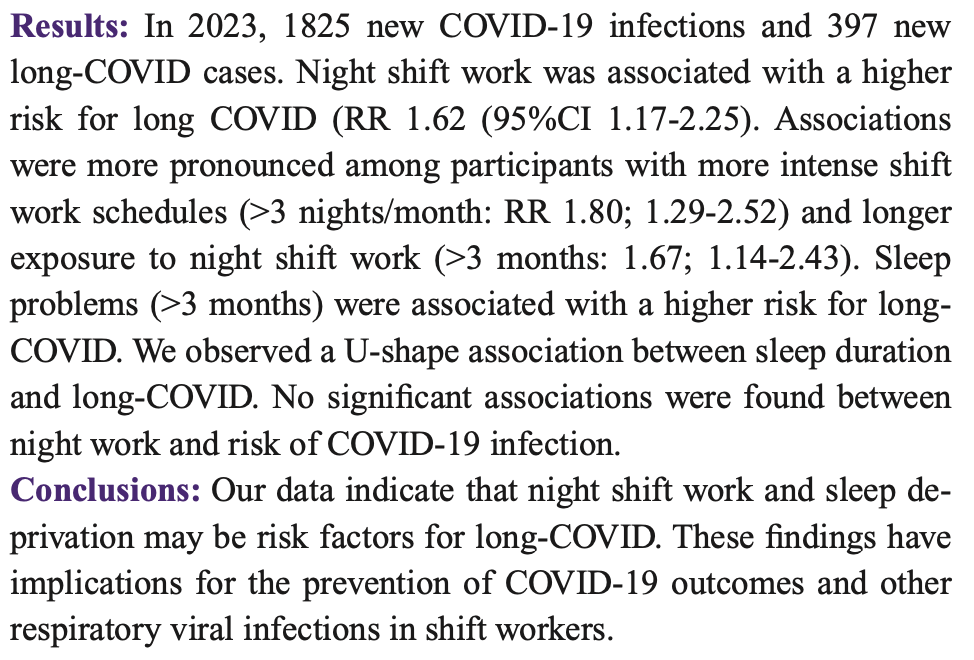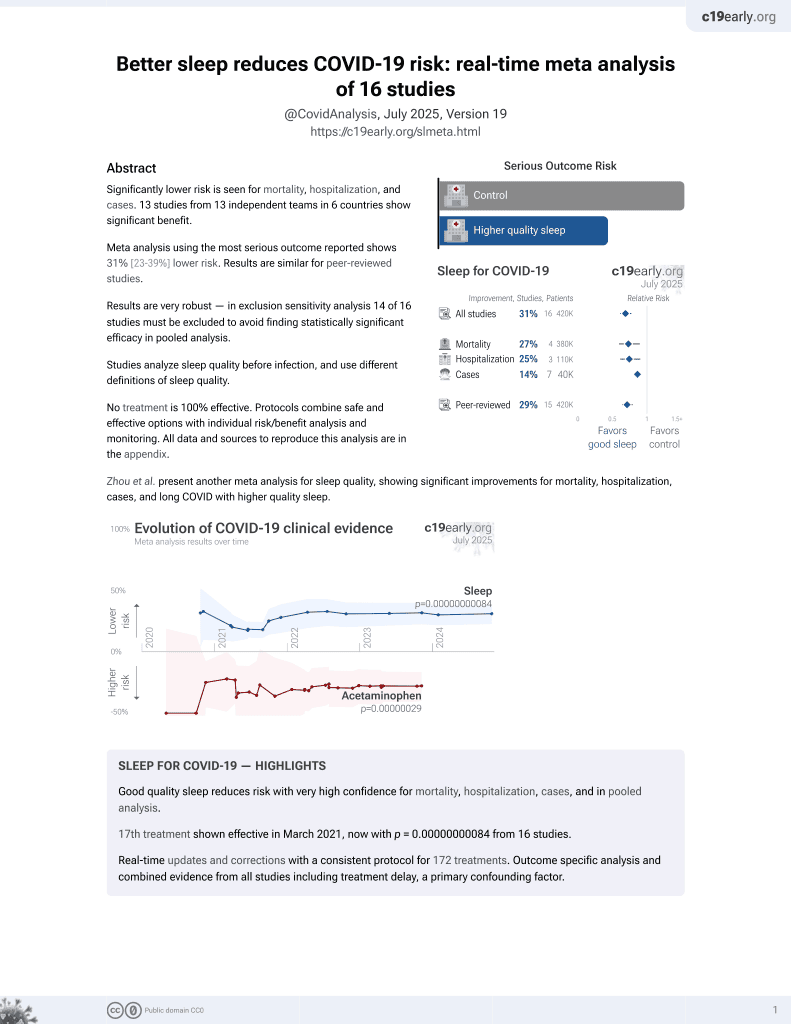
Night shift work, sleep disruption and risk of COVID-19 outcomes
et al., Occupational Medicine, doi:10.1093/occmed/kqae023.0340, Jul 2024
Sleep for COVID-19
18th treatment shown to reduce risk in
March 2021, now with p = 0.00000000084 from 16 studies.
No treatment is 100% effective. Protocols
combine treatments.
6,400+ studies for
210+ treatments. c19early.org
|
Prospective study of 3,319 adults in Spain showing that sleep problems and night shift work were associated with a higher risk of long COVID.
Papantoniou et al., 1 Jul 2024, prospective, Spain, peer-reviewed, 15 authors.
NIGHT SHIFT WORK, SLEEP DISRUPTION AND RISK OF COVID-19 OUTCOMES
Materials and Methods: Data from the HORMONIT study will be used. This study included 51 male, rotating shift workers from the automotive industry in Barcelona, Spain, sampled twice at the end of a 3-week night-shift (22:00-06:00 hrs) and 3-week day-shift (06:00-14:00 hrs) rotation. Participants collected urine voids over 24-hours, gave blood twice, wore several sensors, and responded to questionnaires during each shift. We examined the levels of several hormones (including aMT6s, the major metabolite of melatonin), cytokines and metabolomic markers. By comparing aMT6s production and sleep periods, we evaluated adaptation to shift work. Results: We found evidence that melatonin and sex steroid hormones, cytokines, and metabolomic markers were perturbed during night shift work. These are related to hormone-dependent cancers (breast, prostate) and other chronic diseases. We identified several variables associated with the ability to adapt to a slow rotating shift schedule using a central circadian biomarker-based approach. However, peripheral rhythms did not necessarily show signs of synchronization. Conclusions: These findings provide new evidence linking night shift work to chronic disease. While adaptation may be beneficial for reducing chronic disease risk, it likely depends on the type of shift schedule and speed of rotation.
DOI record:
{
"DOI": "10.1093/occmed/kqae023.0340",
"ISSN": [
"0962-7480",
"1471-8405"
],
"URL": "http://dx.doi.org/10.1093/occmed/kqae023.0340",
"abstract": "<jats:title>Abstract</jats:title>\n <jats:sec>\n <jats:title>Introduction</jats:title>\n <jats:p>Emerging evidence links circadian and sleep disruption with infectious disease outcomes. We examined the association of exposure to night shift work and sleep disruption with COVID-19 infection outcomes in a prospective cohort study.</jats:p>\n </jats:sec>\n <jats:sec>\n <jats:title>Methods</jats:title>\n <jats:p>We included 3,319 adult participants from a population-based cohort study in Catalonia, Spain (COVICAT study). In 2021, current night shift work, night shift work frequency, night shift work duration, sleep duration (hours) and frequency of sleep problems were assessed. In 2023, probable COVID-19 infection was defined based on questionnaires (hospital admission, positive test, or &gt;3 symptoms), seropositivity and through electronic health records. Long COVID was defined as persistent COVID-19 symptoms for &gt;3 months. We calculated log-binomial Relative Risks (RR) adjusting for individual-level covariates such as age, sex, education, type of survey.</jats:p>\n </jats:sec>\n <jats:sec>\n <jats:title>Results</jats:title>\n <jats:p>In 2023, 1825 new COVID-19 infections and 397 new long-COVID cases. Night shift work was associated with a higher risk for long COVID (RR 1.62 (95%CI 1.17-2.25). Associations were more pronounced among participants with more intense shift work schedules (&gt;3 nights/month: RR 1.80; 1.29-2.52) and longer exposure to night shift work (&gt;3 months: 1.67; 1.14-2.43). Sleep problems (&gt;3 months) were associated with a higher risk for long-COVID. We observed a U-shape association between sleep duration and long-COVID. No significant associations were found between night work and risk of COVID-19 infection.</jats:p>\n </jats:sec>\n <jats:sec>\n <jats:title>Conclusions</jats:title>\n <jats:p>Our data indicate that night shift work and sleep deprivation may be risk factors for long-COVID. These findings have implications for the prevention of COVID-19 outcomes and other respiratory viral infections in shift workers.</jats:p>\n </jats:sec>",
"author": [
{
"affiliation": [
{
"name": "Medical University of Vienna, Department of Epidemiology , Vienna, Austria"
}
],
"family": "Papantoniou",
"given": "Kyriaki",
"sequence": "first"
},
{
"affiliation": [
{
"name": "Department of Epidemiology, Center for Public Health, Medical University of Vienna , Vienna, Austria"
}
],
"family": "Espinosa",
"given": "Ana",
"sequence": "additional"
},
{
"affiliation": [
{
"name": "Barcelona Institute for Global Health (ISGlobal) , Barcelona, Spain"
}
],
"family": "Castano-Vinyals",
"given": "Gemma",
"sequence": "additional"
},
{
"affiliation": [
{
"name": "Barcelona Institute for Global Health (ISGlobal) , Barcelona, Spain"
}
],
"family": "Karachaliou",
"given": "Marianna",
"sequence": "additional"
},
{
"affiliation": [
{
"name": "Barcelona Institute for Global Health (ISGlobal) , Barcelona, Spain"
}
],
"family": "Harding",
"given": "Barbara",
"sequence": "additional"
},
{
"affiliation": [
{
"name": "Barcelona Institute for Global Health (ISGlobal) , Barcelona, Spain"
}
],
"family": "Palomar",
"given": "Anna",
"sequence": "additional"
},
{
"affiliation": [
{
"name": "Barcelona Institute for Global Health (ISGlobal) , Barcelona, Spain"
}
],
"family": "Aguilar",
"given": "Ruth",
"sequence": "additional"
},
{
"affiliation": [
{
"name": "Barcelona Institute for Global Health (ISGlobal) , Barcelona, Spain"
}
],
"family": "Moncunill",
"given": "Gemma",
"sequence": "additional"
},
{
"affiliation": [
{
"name": "Barcelona Institute for Global Health (ISGlobal) , Barcelona, Spain"
}
],
"family": "Dobano",
"given": "Carlota",
"sequence": "additional"
},
{
"affiliation": [
{
"name": "Barcelona Institute for Global Health (ISGlobal) , Barcelona, Spain"
}
],
"family": "Straif",
"given": "Kurt",
"sequence": "additional"
},
{
"affiliation": [
{
"name": "Barcelona Institute for Global Health (ISGlobal) , Barcelona, Spain"
}
],
"family": "de Cid",
"given": "Rafael",
"sequence": "additional"
},
{
"affiliation": [
{
"name": "Barcelona Institute for Global Health (ISGlobal) , Barcelona, Spain"
}
],
"family": "Garcia-Aymerich",
"given": "Judith",
"sequence": "additional"
},
{
"affiliation": [
{
"name": "Barcelona Institute for Global Health (ISGlobal) , Barcelona, Spain"
}
],
"family": "Kogevinas",
"given": "Manolis",
"sequence": "additional"
},
{
"affiliation": [
{
"name": "Boston College, Chestnut Hill , MA, United States of America"
}
],
"family": "Straif",
"given": "Kurt",
"sequence": "additional"
},
{
"affiliation": [
{
"name": "Genomes for Life-GCAT lab. Germans Trias i Pujol Research Institute (IGTP) , Badalona, Spain"
}
],
"family": "de Cid",
"given": "Rafael",
"sequence": "additional"
}
],
"container-title": "Occupational Medicine",
"content-domain": {
"crossmark-restriction": false,
"domain": []
},
"created": {
"date-parts": [
[
2024,
7,
5
]
],
"date-time": "2024-07-05T15:28:04Z",
"timestamp": 1720193284000
},
"deposited": {
"date-parts": [
[
2024,
7,
5
]
],
"date-time": "2024-07-05T15:28:05Z",
"timestamp": 1720193285000
},
"indexed": {
"date-parts": [
[
2024,
7,
6
]
],
"date-time": "2024-07-06T00:19:56Z",
"timestamp": 1720225196100
},
"is-referenced-by-count": 0,
"issue": "Supplement_1",
"issued": {
"date-parts": [
[
2024,
7,
1
]
]
},
"journal-issue": {
"issue": "Supplement_1",
"published-online": {
"date-parts": [
[
2024,
7,
3
]
]
},
"published-print": {
"date-parts": [
[
2024,
7,
5
]
]
}
},
"language": "en",
"license": [
{
"URL": "https://academic.oup.com/pages/standard-publication-reuse-rights",
"content-version": "vor",
"delay-in-days": 0,
"start": {
"date-parts": [
[
2024,
7,
1
]
],
"date-time": "2024-07-01T00:00:00Z",
"timestamp": 1719792000000
}
}
],
"link": [
{
"URL": "https://academic.oup.com/occmed/article-pdf/74/Supplement_1/0/58450092/kqae023.0340.pdf",
"content-type": "application/pdf",
"content-version": "vor",
"intended-application": "syndication"
},
{
"URL": "https://academic.oup.com/occmed/article-pdf/74/Supplement_1/0/58450092/kqae023.0340.pdf",
"content-type": "unspecified",
"content-version": "vor",
"intended-application": "similarity-checking"
}
],
"member": "286",
"original-title": [],
"page": "0-0",
"prefix": "10.1093",
"published": {
"date-parts": [
[
2024,
7,
1
]
]
},
"published-online": {
"date-parts": [
[
2024,
7,
3
]
]
},
"published-other": {
"date-parts": [
[
2024,
7,
1
]
]
},
"published-print": {
"date-parts": [
[
2024,
7,
5
]
]
},
"publisher": "Oxford University Press (OUP)",
"reference-count": 0,
"references-count": 0,
"relation": {},
"resource": {
"primary": {
"URL": "https://academic.oup.com/occmed/article/74/Supplement_1/0/7706812"
}
},
"score": 1,
"short-title": [],
"source": "Crossref",
"subject": [],
"subtitle": [],
"title": "SS58-04 NIGHT SHIFT WORK, SLEEP DISRUPTION AND RISK OF COVID-19 OUTCOMES",
"type": "journal-article",
"volume": "74"
}
